Berney Arms: The hamlet that has all but disappeared
- Published
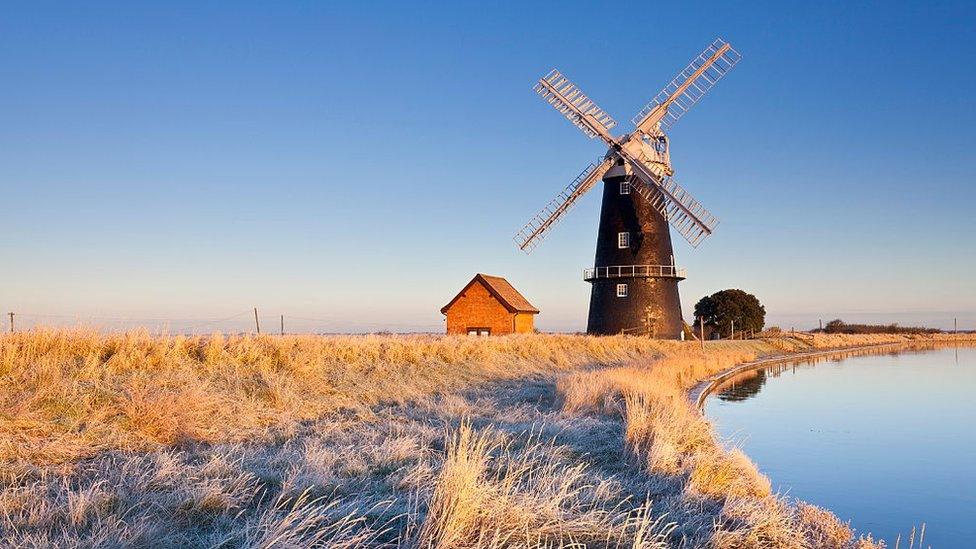
Berney Arms was once home to a small but thriving community of 11 families
The Norfolk hamlet of Berney Arms was once home to a small but thriving community of 11 families. Today, it lies empty but for an unused pub, an RSPB centre, a closed marsh mill and a railway station. What was it like to live there and what does its future hold?
"I would go back and live there tomorrow if I could," says Sheila Hutchinson.
She was raised in Berney Arms, a remote settlement sitting on the north bank of the River Yare near Great Yarmouth.
"At one time there were 11 families there," she says.
Livelihoods were eked out largely from the land itself, whether directly at the marsh mill or indirectly from grazing cattle.
The last lifelong residents to leave Berney Arms were Mrs Hutchinson's uncle Stanley Hewitt and his family.
They left in 1988 when their farmhouse was sold to the RSPB.
"When we were growing up we had no running water, no electricity and a fireplace in the kitchen," says Mrs Hutchinson.
"People have asked me what it was like growing up like that. The answer is simple - we didn't know anything different."
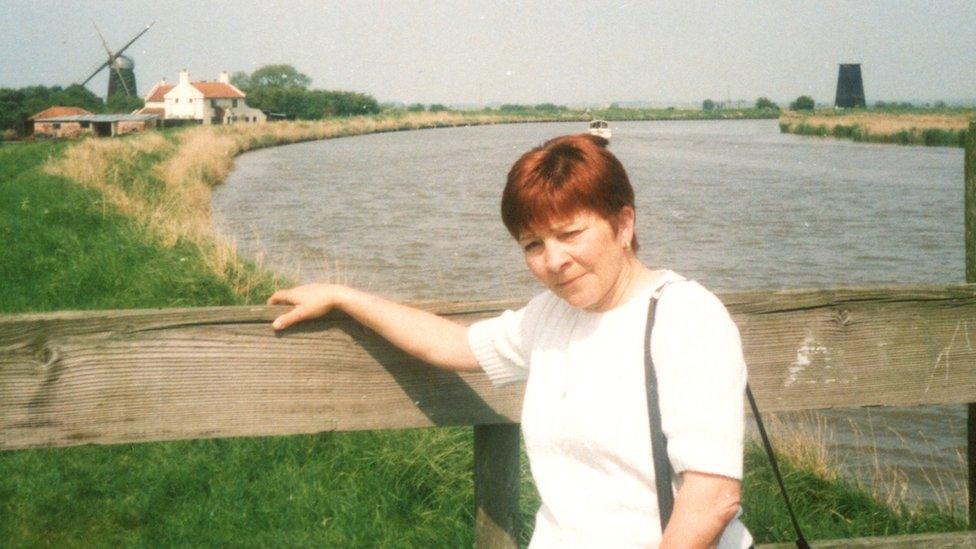
Sheila Hutchinson left Berney Arms in 1963, a year after her grandfather, a dairy farmer, left the hamlet
Drinking water used to come from the roof, through a pipe with a sock on the end acting as a filter and then into a tank.
With no trees or other buildings around, winter winds were ferociously cold, Mrs Hutchinson says.
Water left in a jug overnight would freeze and would have to be heated over a flame in the morning before it could be used.
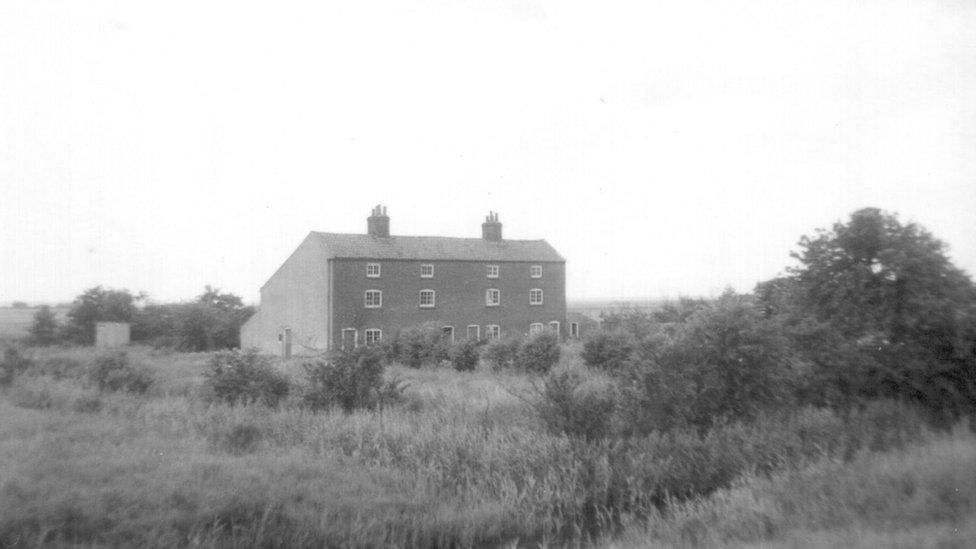
Mrs Hutchinson lived in the furthest left of a terrace of four cottages. Their toilet was at the end of the garden
"In the winter months the cold would go right through you," she says.
"But I don't remember ever being poorly or having a day off school," the 75-year-old says. "We were hardy."
To get to school each day she walked across nearly a mile of marshland before arriving at the railway station. She carried a flannel and a towel with her to clean up before getting on the train to get to her school in Great Yarmouth.
Author Mrs Hutchinson, who wrote Berney Arms Past and Present with her husband Paul, remembers the breath-taking views from her and her brother's bedrooms, which stretched out to Burgh Castle on one side and the railway station on the other.

Her family's story begins with her grandfather Henry Hewitt, who owned cattle and the farmhouse in Berney Arms. Her father looked after the cows and a living was made selling milk.
The community's primary links with the outside world centred on the railway station.
From the trains that stopped at Berney Arms came the post, the newspapers and - twice a week - the groceries.
"If you missed something off your grocery list," she says, "that was it until the next delivery."
Today, the station remains open.
Gone is the post, the newspapers and the groceries - to be replaced primarily by people interested in seeing birdlife.
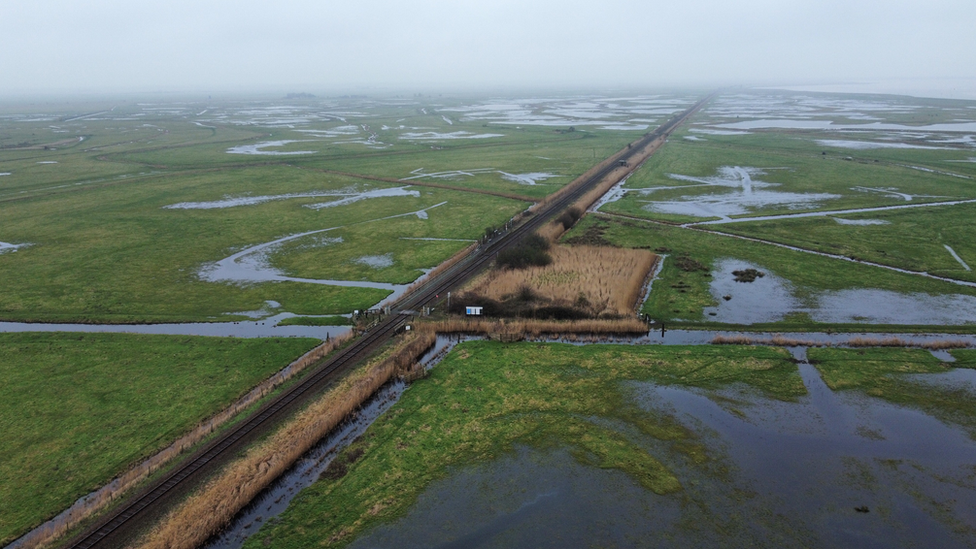
The railway line is still operational and stops, when requested, at Berney Arms
Mrs Hutchinson fears the way of life she was raised in has gone forever in Berney Arms. And she doubts such a community will ever again be formed there.
Asked if that makes her a little bit sad, she says, simply: "Yes."
Though if the pub, which closed in 2015, can be successfully brought back to life, she says, there is probably a living to be made from the growing number of visitors coming to explore Berney Arms.
Last year, the railway station at Berney Arms, which has seating for six people, saw the largest rise in passenger numbers of any stop in the UK.
Once the quietest station in the country, Berney Arms saw its passenger numbers rise eightfold from just 42 in 2019-2020 to 348 last year - though the increase is almost entirely explained by the pandemic and the fact the line was closed for much of the year for upgrades and the laying of new track.
The station, which is only accessible on foot, is a request stop on the line between Norwich and Great Yarmouth. It is surrounded by the RSPB's Berney Marshes and Breydon Water reserve.
You might also be interested in:
Jonathan Denby, of Greater Anglia which runs the line, says Berney Arms' continued place on its network is assured.
"From an operational point of view, the rail network is there and is part of the fabric of the nation.
"It gives people the opportunity to do things both for work and also for pleasure."
During the week and on Saturdays there are two trains from Norwich stopping at Berney Arms on their way to Great Yarmouth, but just one train which heads the other way. On Sundays, there are four trains running each way between Norwich and Great Yarmouth.
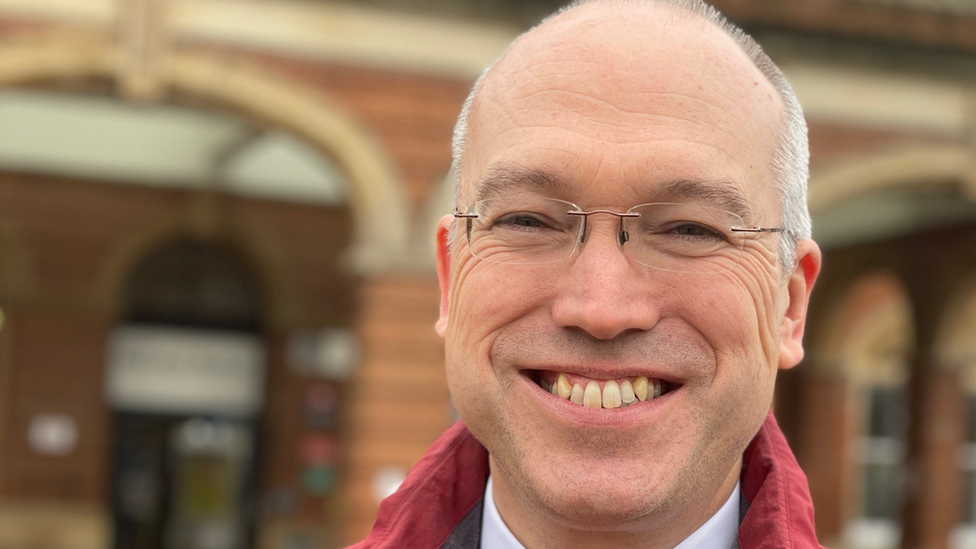
Jonathan Denby, of Greater Anglia, which runs the line, says the rail network is part of the "fabric of the nation" and used for both work and pleasure
The line on which Berney Arms sits is important to Greater Anglia because of Great Yarmouth. When the summer months come, the Berney Arms route gives the operator a second railway line to ferry tourists into the popular coastal town.
"Having another route gives us flexibility," says Mr Denby.
"Berney Arms is also a pretty simple station and is low maintenance for us and when you consider we've already had 800 people using it since April 2021 there is potential for growth there too."
Leisure travel is the area of Greater Anglia's business which has seen the strongest resurgence since the pandemic started.
Mr Denby added: "I think there's a good chance we will see an increase in passenger numbers at places like Berney Arms because people are increasingly enjoying going outside and into the countryside."
Most of those who use the service to and from Berney Arms are walkers and birdwatchers.
The RSPB runs a reserve in the hamlet and it has recently benefited from a major drainage scheme.
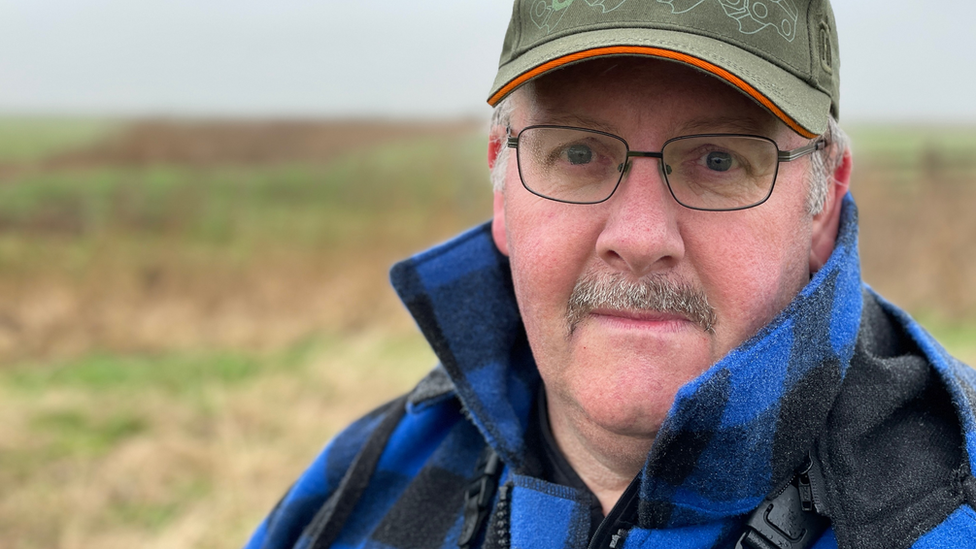
Ian Robinson says Berney Arms has an atmosphere all of its own
"You've got to be a special kind of person to come out here," says Ian Robinson, of the RSPB.
"But I think once you're out here, it has its own atmosphere - big skies, features like Berney windmill and just the fact that you're on your own, with your own thoughts and with wildlife and the landscape you see around you."
With additional reporting by Mike Liggins.

Find BBC News: East of England on Facebook, external, Instagram, external and Twitter, external. If you have a story suggestion email eastofenglandnews@bbc.co.uk, external